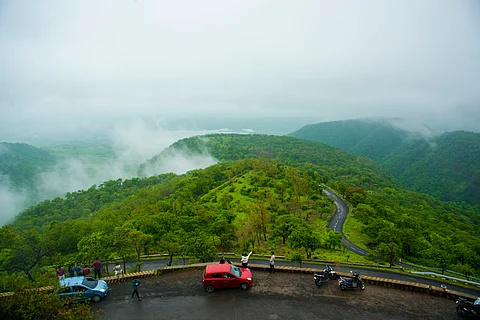
- Destinations
- Experiences
- Stay
- What's new
- Celebrating People
- Responsible Tourism
- CampaignsCampaigns
- SubscribeSubscribe
- Buy NowBuy Now

Imagine you have stumbled upon a quaint hilly getaway in Maharashtra that not a lot of people know about. If you're seeking out a hidden gem away from the usual crowds, Chikhaldara might be the place to be. Tucked away in Maharashtra’s Vidarbha region, Chikhaldara is the state’s only hill station in this part of the state and a destination that remains refreshingly under the radar. Perched at around 1,118 metres above sea level in the Amravati district, this lush retreat combines natural beauty, wildlife, mythology, and the rare distinction of being home to Maharashtra’s only coffee plantations. Whether you're drawn by the cool weather, the green vistas, or the promise of a hot local brew, Chikhaldara offers a fulfilling escape for every kind of traveller.
Chikhaldara’s biggest claim to fame is its coffee. This is the only region in Maharashtra where coffee is grown commercially. A guided plantation tour is a must learn about the journey from bean to cup, and savour freshly brewed local coffee amid the cool mountain air. It’s a particularly rewarding stop for caffeine enthusiasts and curious travellers alike.
History buffs can explore the 12th-century Gavilgad Fort, located near the Maharashtra–Madhya Pradesh border. Complete with Persian inscriptions, old cannons, and stunning hilltop views, this fort reveals architectural marvels of a bygone era and makes for an excellent half-day hike.
Around 78 km from Chikhaldara lies Bhimkund, a deep blue natural water tank wrapped in Mahabharata legend. It’s believed that Bhima created this pool by striking the ground after slaying Keechaka. Even if mythology doesn’t pull you in, the serenity and striking geology will.
Chikhaldara is peppered with viewpoints, and Panchbol Point is one of the most intriguing. Here, sounds echo five times across the valley, a natural acoustic marvel. Hariken Point, another scenic stop, offers sweeping views of valleys and forests, especially dramatic at sunrise or sunset.
Shakkar Lake and Semadoh Lake are peaceful spots for boating or simply relaxing by the water, with dense greenery all around. Wildlife is often visible in the quieter hours, especially near Semadoh, which sits close to the Melghat Tiger Reserve.
A major attraction in the region, the Melghat Tiger Reserve is home to tigers, leopards, sloth bears, sambar deer, and over 250 bird species. Early morning or evening safaris offer the best chance to spot wildlife. Even if you don’t catch a glimpse of a tiger, the thick teak and bamboo forests are a treat to wander through.
While Chikhaldara doesn’t boast an extensive culinary scene, there are several places that serve hearty, flavourful meals. Look out for:
Vidarbha-style thalis, with spicy varhadi dishes like zunka, pithla, and sabudana khichdi.
Maharashtrian favourites such as poha for breakfast or puran poli as a sweet treat.
Local restaurants and resorts often serve simple, home-style vegetarian meals.
For coffee, don’t miss sampling brews made from locally grown beans. Some homestays and plantation cafés offer excellent cups paired with valley views.
Stick to established eateries and avoid roadside stalls if you have a sensitive stomach. Bottled water is recommended.
Chikhaldara offers a modest but comfortable range of accommodation:
MTDC Resort Chikhaldara: Government-run, basic but set in a great location with valley views.
Harshawardhan Hotel: Popular among families and larger groups.
Satpura Retreat: Tucked amid greenery, ideal for couples or solo travellers seeking quietude.
Local guesthouses and homestays: For those wanting a more immersive, local experience, often run by families who can offer homemade food and local insights.
During weekends and school holidays, rooms can fill up fast. It’s wise to book in advance, especially during the peak travel months.
By Air:
The closest airport is Dr Babasaheb Ambedkar International Airport in Nagpur, roughly 230 km away. From Nagpur, hire a cab or take a bus for a scenic drive to Chikhaldara.
By Train:
Badnera Junction (around 110 km away) is the nearest major railway station, with good connections to Mumbai, Pune, and Nagpur. Taxis and state transport buses are available from here.
By Road:
Chikhaldara is well connected by road to cities like Nagpur, Amravati, and Akola. Both government and private buses operate daily services. For those driving, the roads are largely in good condition and the journey—particularly in cooler months—is scenic and enjoyable.
The ideal time to explore Chikhaldara is October to June, when the weather is cool and perfect for sightseeing. The monsoon months (July–September) transform the region into a misty green wonderland, but heavy rains can cause road disruptions and make forest trails slippery.
Clothing: Carry layers. Days are pleasant, but evenings can get nippy. In the monsoon, bring waterproof gear and sturdy shoes.
Health and safety: Carry basic medications and stick to bottled water. Use insect repellent when visiting forested areas.
Wildlife etiquette: Stay silent, avoid littering, and follow all reserve rules. Respect for nature ensures it stays protected.
Connectivity: Mobile network coverage can be patchy, so don’t rely solely on digital maps or communication.
Chikhaldara’s charm lies in its unhurried pace, unspoiled nature, and unique blend of experiences—from mystical legends and historic forts to wildlife sightings and fragrant coffee. For anyone seeking a quiet retreat off the typical tourist trail, it’s a destination worth discovering. Whether you're a photographer, a hiker, a history buff, or simply someone in need of a break, Chikhaldara is Maharashtra’s gentle reminder that serenity still exists.
